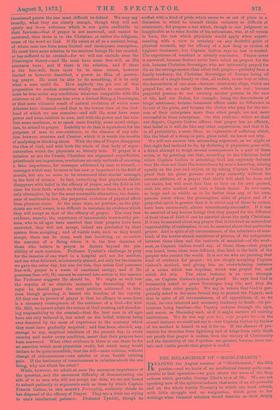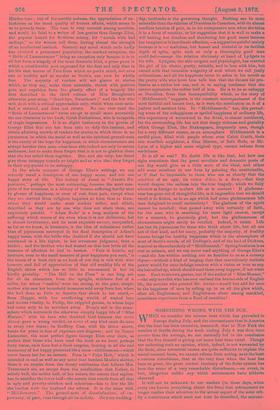THE MELANCHOLY OF " MIDDLEMARCH."
READING the August number of " Middlemarch," the fifth portion—and we know of no intellectual luxury quite com- parable to that operation—we gain afresh the sense of the deep sadness which pervades George Eliot's view of life. We are not speaking now of the spiritual sadness, that sense of an all-powerful and on the whole hostile Necessity to which one must submit, with little struggle and no resignation, which gives to her writings what Oriental scholars would describe as their deeply
Hindoo tone ; but of the earthly sadness, the appreciation of un- luckiness as the usual quality of human affairs, which seems to us to pervade them. The tone is very unusual among novelists, and would be fatal to a writer of less genius than George Eliot, the popular hatred for fictitious misery, for "novels with bad endings," as the women call them, having almost the strength of an intellectual instinct. Scarcely any novel which ends badly has attained a permanent popularity, the marked exception, the " Bride of Lammermoor " being an exception only because it is in all but form a tragedy of the most dramatic kind, a prose poem in which a considerable poet expressed for the first and only time in his life that horror of Fate from which no poet's mind, not even one as healthy and as secular as Scott's, can ever be wholly free. The majority of readers will not glance at stories which, as they say, make them miserable, shrink with positive pain and repulsion from the ghastly effect of a tragedy like that described in the third volume of Miss Broughton's otherwise poor story, " Good-bye, Sweetheart ;" and the few who will, do it with a critical appreciation only, which when once satis- fied is satiated, and does not return. No one ever read the "Bride of Lammermoor" twice except to recall more accurately the one character in the book, Caleb Balderstone, who is incapable of tragic impressions. It is no slight testimony to the genius of George Eliot that she has been able to defy this instinct, and obtain admiring crowds of readers for stories in which there is no joyousness, in which the social as well as the spiritual ground-note is the vanity of the hope for happiness, in which circumstances are always harsher than men,—has been able indeed not only to secure audiences, but to make them forget that it is not to gladden them that she has called them together. She, and she only, has dared give them unhappy comedy so bright and so wise that they forget in their enjoyment to be unhappy.
In the whole compass of George Eliot's writings we can scarcely' recall a description of one happy scene, and not one happy story of life. The history of Janet in " Janet's Re- pentance," perhaps the most entrancing, because the most com- plete of her creations, is a history of human suffering hardly shot by gleams of happiness, or even of rest from pain, except when they are derived from religious impulses so keen that in them- selves they would make most readers suffer, and which, described as they are by one who does not share them, are exquisitely painful. " Adam Bede" is a long analysis of the suffering which comes of sin even when it is not deliberate, but is almost involuntary, and its most exquisite nuance, unequalled, as far as we know, in literature, is the idea of submission rather than of joyousness conveyed in the final description of Adam's happy home, with the bride who doubted if she should not have continued in a life higher, in her erroneous judgment, than a bride's ; and the brother who had wasted on that lost bride all the treasure of affection he had to bestow. "Fate is hostile, my brothers, even to the small measure of poor happiness you seek," is the lesson of a book rich as no book of our day is rich with wise humour, and full of appreciation of that old wealthy life of the English shires which has so little to recommend it but its kindly geniality. "The Mill on the Floss" is one long sob for all its characters, from the upright, stubborn fool of a miller, for whom " raskils" were too strong, to the poor, simple mother who saw her household treasures sold away from her, when she had done so little to deserve that shock to her creed,— from Maggie, with her overflowing wealth of wasted love and useless vitality, to Philip, the crippled genius, to whom hope had come only to be snatched away. Deeply sad is the atmo- sphere which surrounds the otherwise sleepily happy life of "Silas Marner," with its hero who doubted God because the sorter diuinte gave a wrong verdict, as sorter of any kind must do once in every two times; its Godfrey Cass, with his bitter secret, borne for years in fear of exposure and disgrace; and its Nancy Lammeter, the most perfect figure George Eliot ever drew, so perfect that those who have read the book as we have, perhaps forty times, each time feel a fresh surprise, bearing in all the cool innocency of her happy protected life a cross—childlessness—which never leaves her for an instant. Even in " Felix Holt," which is intended to end as well as any novel that burdens Mudie's shelves, there is no respite from the dreary retribution that follows Mrs. Transome's sin, no escape from the recollection that Esther, to satisfy half, the nobler half, of her nature, the nature that aspires, has to sacrifice the lower half—the nature that recoils from all that is ugly and poverty-stricken and colourless—has to live the life she loathes with the husband she adores. It is the same with " Middlemarch." The ground-note of dissatisfaction, of ex- pectancy, of pain, runs through all its melody. On your welding- day, toothache is the governing thought. Nothing can be more miserable than the relation of Dorothea to Casaubon, with its almost needless touches of pain, as in his irresponsive arm when she takes it in a fever of emotion, or his suggestion that it is well to make a will barring her freedom and slandering her good name because her temptation is inordinate affection,—a suggestion painful mainly because it is not malicious, but honest and truthful in its devilish depth of spite, spite such as only a thoroughly good man could feel—except the relation obviously at hand of Lydgate to his wife. Lydgate, the able surgeon and physiologist, has married the girl of his choice, pretty, suitable, and in love with him, but cursed with that incurable vulgarity of soul which we call justly ordinariness, and all his happiness turns to ashes in his mouth as the pretty wife who loves him tells him that she detests his pro- fession as a rather low one, and in so saying confesses that she cannot appreciate the nobler half of him. He is to be as unhappy as Dorothea, from that incompatibility which, as the story of " Middlemarch " suggests, is the constant accompaniment of the most faithful and honest love, as it were the retribution on it of a jealous and sentient fate. In "Middlemarch," too, this pervad- ing sense of the unhappiness or spoiled happiness of ordinary life, this expectancy of wormwood in the drink, is almost unrelieved, for the surrounding life has not that sleepy richness and geniality which George Eliot, like Shakespeare, frequently uses, though for a very different reason, as an atmosphere. Middlemarch is a sordid place, filled with people whom even Caleb Garth, their one unselfish neighbour, a Silas Marner, or Seth Bede, or Mr. Lyon of a higher and more original type, cannot redeem from sordidness.
It is all so real ? No doubt life is like that, but how one sighs sometimes that the great novelists and dramatic poets of our day would give us a little more of the 'ideal, and either add some sunshine to our lives by painting the unattainable, or if that be impossible to those who see so clearly that the condition of an opal, its raison d'être, is a flaw,—that they would deepen the sadness into the true tragedy, which we fully admit is as foreign to modern life as is content I If gladsome- ness has gone out of thoughtful life, is it impossible that we should recall it in fiction, as in an age which had some gladsomeness left men delighted to recall melancholy ? The gladness of the spirit cannot be recalled ; that passed away with certainty of faith, for the man who is searching for more light cannot, except for a moment, be genuinely glad, but the gladsomeness of circumstance might surely be recalled. indeed, it exists. Life has lost its joyousness for those who think about life, but all are not of that kind, and for many, probably the majority, of healthy human beings the healthy happiness which is the atmosphere of most of Scott's novels, of all Trollops's, and of the best of Dickens, is as real as the melancholy of " Middlemarch." Spring freshness is as real as miasma, and we can never read anything of George Eliot's —and she has written nothing not as familiar to us as a nursery rhyme—without a kind of longing that that marvellously realistic power would for once indulge readers with a vision as true as any she has called up, which should send them away happier, if not wiser men. Each to his own genius, but if the author of " Silas Marner," —the only novelist who has ever realised the bovine aide of English life, the novelist who painted Mr. Irvine—would but add for once to the happiness of men by calling up in us all the glow which, after all, Englishmen, and Englishmen alone among mankind, sometimes experience from a flood of sunshine!



































 Previous page
Previous page